| Short cuts : | Home | Contents | Photos | Ramblings | Contacts | Whats new | : : : | : : : |
I have an old friend who lives in Singapore, and so when I came across some of Shamini Flint's Inspector Singh books in some charity shop somewhere, saw that there were based in Singapore, Malaysia and Asia generally, I thought that is certainly different, and decided to give them a go.
Shamini Flint was born in 1969 in Kuala Lumpur in Malaysia. She studied law with great distinction and won a prize for the highest marks overall in her Bar finals at Trinity College London in 1993. Following this she was employed by Zain and Co, and was called to the Malaysian Bar. She undertook further law studies at Cambridge University between 1994 and 1995 and was awarded top marks in her year, won the Bevan prize and the Jennings prize, and was admitted as a Solicitor, Supreme Court of England in 1999. She worked as a corporate lawyer at the international law firm Linklaters from 1997 to 2002. She ended up as an Associate Professor of the Law Faculty , National University of Singapore. In short, a stellar career. She travelled extensively round Asia for her work. And then she resigned to be a stay at home mum, writer, part time lecturer and environmental activist.
Shamini worked to promote fair trade products in Singapore. She took to book writing in 2004, and donates part of the proceeds of her environmental books to the WWF. Her earliest books were children's stories, especially the "Sasha visits...." series. She lives in Singapore with her husband Simon Flint, and their two children yes, Sasha and Spencer. She is a campaigning environmentalist and also writes a variety of other books with a cultural and environmental themes. She took to writing crime fiction later on, and the first Inspector Singh book was written round about 2008, and published in 2009. The British publishing house Brown and Company bought the world wide rights to these Inspector Singh books in 2008.
I have now read the first Inspector Singh book, and there are two stong elements that illustrate Shamini's background. The Lee Timber company is a corrupt Malaysian organisation illegally felling hard wood forests in Borneo and persecuting the indigineous Penan people - i.e. the environmental activist. And Chelsea Lee has to contend with two legal systems in Malaysia as she fights for custody of her children - the Civil Courts, and the Syariah Moslem Court - i.e. the law background.
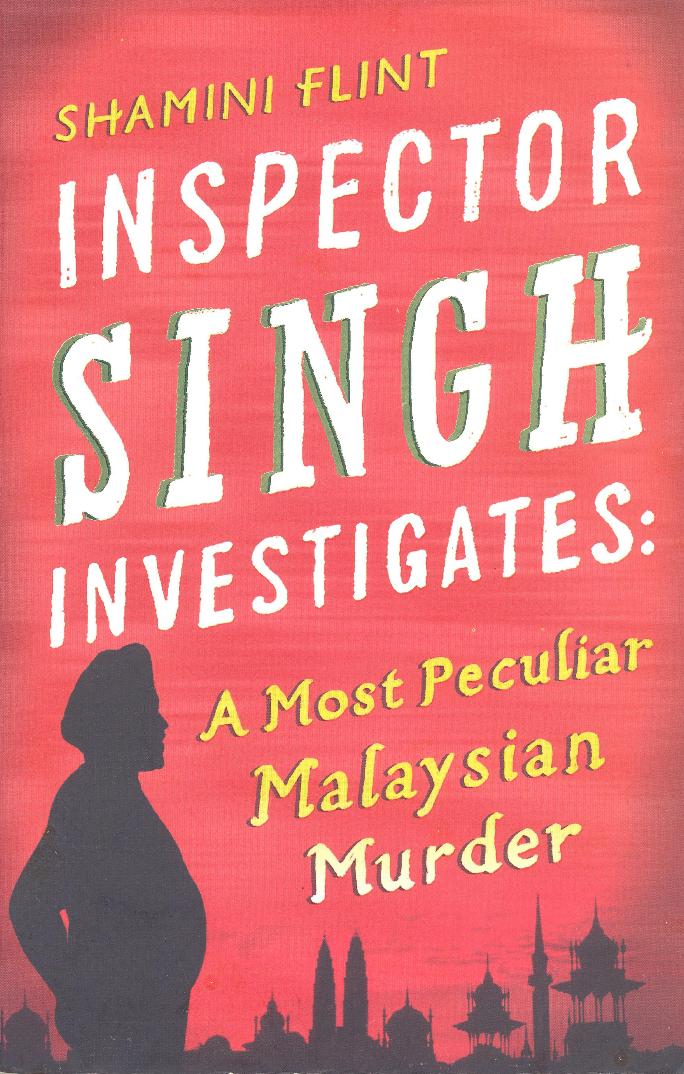
I read this book in August, 2017.
This is book one in the Inspector Singh series and mostly I liked the book and the main character. I could have done with more of an introduction to Singh's background, but no doubt we will pick up snippets as the series proceeds. We do know that he is based in Singapore, a separate country island at the foot of the Malaysian peninsula, and connected to Malaysia through two bridges. Both Malaysia and Singapore are former British colonies. Inspector Singh has been in the police force about 30 years, is very fat and unfit, and smokes - he transfers the cigarettes from modern health warning packets to an older packet he keeps especially for this purpose. He wears white sneakers for comfort, and sweats a lot. As a Sikh he wears six metres of black cloth tightly wound into a turban - no wonder he sweats. In short, he is an overweight, sweaty, hairy policeman. He has an excellent track record at solving murders, but is one of the last mavericks on the Singapore police force and his superiors want rid of him. The present case is a poisoned chalice overset with politics - Singh must fail, and soon he will be out. Politics trumping a proven track record as a good police detective - where have we heard that before ?
The story introduces us to former top model Chelsea Lee accused of killing her husband Alan. He was a cruel wife beating womaniser - at long last Chelsea had broken away and was fighting for custody of their three children through the Civil Courts. When Alan saw that he was losing he hit upon a brilliant strategy - he converted to Islam, and so the children were Moslem children whose fate would be decided in the separate Syariah Moslem court. Chelsea argued that the conversion to the Moslem faith was not genuine, but he had followed the right procedures and the Moslem court would not look behind these at the motive. Chelsea lost he temper in court and shouted at her husband -"if you take my children I will kill you". And so, when Alan is shot in the street, Chelsea is chief suspect and under arrest. She is of Singapore nationality, and so Singapore send a representitive to ensure she gets a fair trial - i.e. enter Inspector Singh.
Naturally the Malaysian police do not welcome Singh but they have been told to cooperate and so Inspector Mohammed assigns a young but keen policeman Sergeant Shukor to babysit Singh. Singh and Mohammed clash on lots of occasions, but at the end of the day both want the correct killer in jail. Suprisingly in a very good ending all three policemen separately do the right thing in a triumph of fairness over the strict letter of the law. Singh had been impressed by Chelsea's innocence - or was he influenced by her beauty? Alan Lee's brother Jasper confesses to the murder, and Chelsea is released, but then Chelsea persuades Singh to stay on in Malaysia (he takes holiday leave and stays with his sister) and find the true murderer. Chelsea was convinced it could not be Jasper - but was she right ? Jasper said he killed his brother because as an environmental activist he had to stop Alan's company illegally destroying hard wood forests in near by Borneo. And so now we have the two connections dear to Shamini - environment and law.
We meet further possible suspects - Chelsea and Alan's eldest 17 year old son Marcus. Alan had stolen Marcus's girl friend Shafariah with lies and gifts and so Marcus had an obvious motive. Shafariah also could have killed Alan for revenge. Alan's other brother Kian Min actually ran the Lee Timber Company - could he have killed Alan to gain full control? In turn Chelsea had had her head turned by a one off lover Ravi - did he kill Alan to get at his wealth through the widow? And a final suspect comes on the scene in the shape of Jasper's friend Rupert Winfield who had been living in the forest with a Penan tribe when the tribe was attacked and a pregnant Penan woman was killed.
It all builds to a nice climax and I sort of approved of the ending. It's not a bad effort and I'll read on to see how the series develops.
Links to author index and home page
| Shamini Flint Heading | Author Index | Go to Home Page |
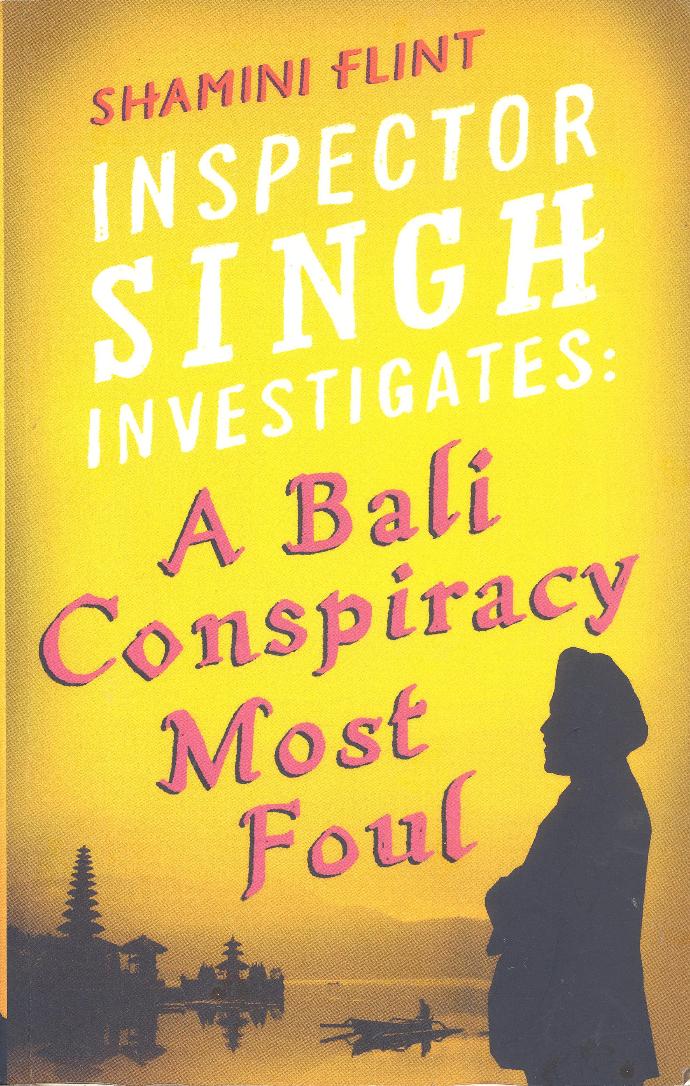
I read this book in September, 2017.
This is the second book in Shamini Flint's Inspector Singh series. I am following this series as I like to read about different places, different people, different customs, and this book does do that. Here we are dealing with a murder investigation set against a background of jihad, moslem terrorists in a Hindu country, the extreme conservatism of the burka, and non western attitudes to women. Singh is a turban wearing Sikh, but is mistaken for a moslem, and is attacked in the street by the poor, distraught mother of a terrorist victim. And in the eyes of a jihadist, you are either a follower or an infidel, and all infidels deserve to die - and especially Americans.
Our hero Singh is a fat and unhealthy police inspector based in Singapore, but his face does not fit because of his non pc attitudes. Although he has a good track record, his superiours would still like to get rid of him if they could, and in this series they seem to be sending him anywhere and everywhere. Here he is sent to Bali to offer assistance in the days after the dreadful terrorist Bali bombings. Singh knows nothing about counter terrorism, but apparently this doesn't matter. In Bali his lack of relevant expertise is soon apparent, but they recognise that he is qualified for a murder investigation. A skull fragment found amidst the victim remains of the bombing has a hole shaped wound. Someone had been shot and the body somehow disposed / dumped on the site of the bombing where it was subsequently destroyed. Was this by chance, or by intention ? And so, although Singh is taken off the terrorist investigations we suspect his murder investigation will somehow link in. Might he end up hunting terrorists after all ? Bronwyn Taylor is a heaftily built Australian policewoman similarly sent to Bali to offer international assistance, but she too has crossed authority, is taken off the major investigation, and assigned to Singh's murder enquiries. She is really of equal rank to Singh, but acknowledges that he is the murder expert, and anxious to get experience of a murder investigation, she happily calls him boss and does the running around.
Somehow or other the skull fragment with the hole in it has been identified as belonging to a missing expat Richard Crouch. Sarah Crouch had been looking for her missing husband, and so we meet Sarah and a group of her fellow expats - an unlikely collection of not very endearing people. Who is sleeping with whom ? All knew Richard - did one of them kill him ? We also meet a group of Indonesians - the young, attractive, subservient Nuri, her much older husband Ghani, and her brothers Abu Bakr and Ramzi. Apparently Ghani is in Bali to set up a moslem religious school - but is that the real reason he is there ? They too are looking for a missing friend - Abdullah - and why is Nuri so anxious ? So many people linked together by their search for the missing !
It's all very well written, and as events unfold, we follow Singh and Bronwyn's murder enquiry. Singh appears to be a bit of a bully - very good at barking out orders, and getting others to run around and do all the work for him. However Singh does come to develop a respect and friendship for Bronwyn. Usually he works alone - here he has someone he can bounce ideas off, and he likes this. Half way through the book I thought it was all very interesting, and different of course. But then Shamini Flint stepped up a gear or two, and the story really took off and built to a climax that I had not seen coming. I was stunned by a final magnificient act of self sacrifice - but so sad.
Shamini gives us an honest, balanced picture of the local people and cultures. It is shaping to be quite an interesting series - I look forward to reading the next book.
Links to author index and home page
| Shamini Flint Heading | Author Index | Go to Home Page |
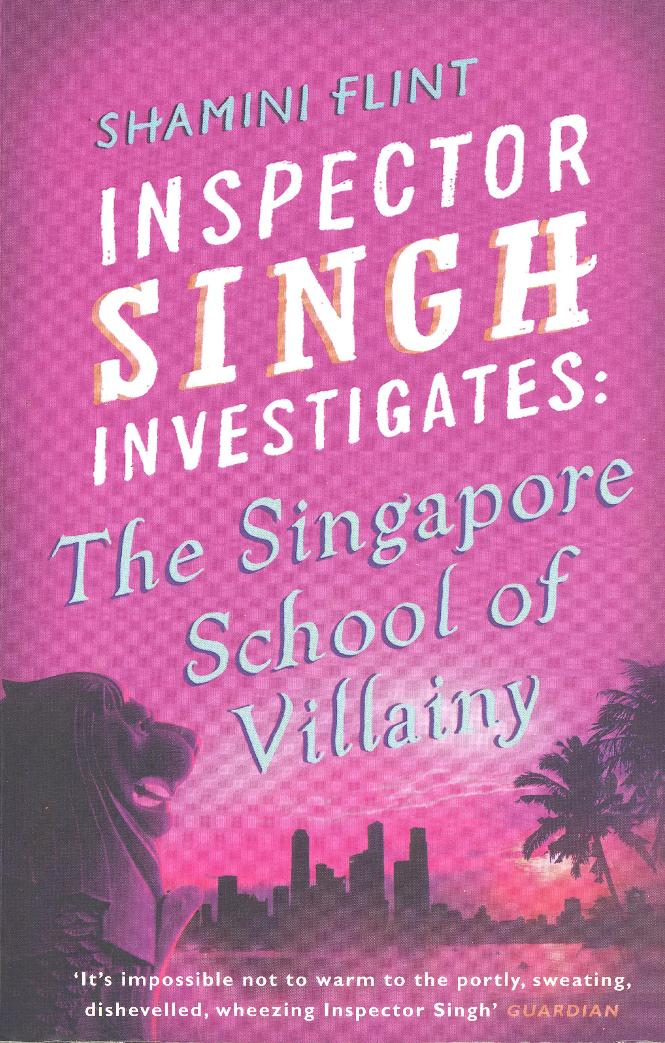
I read this book in November, 2017.
This is book three in Shamini Flint's Inspector Singh series set in Singapore and featuring the most unlikely of heros, a grossly fat, unfit, wheezing police inspector only retained because of his outstanding track record. He is a brilliant detective, and can solve murders. Usually his bosses want rid of him, and give him a tainted assignment in some distant setting - hoping he will fail, and they can get rid of him. But in this story it is a big case with political, expat implications, and it is imperative that a murderer is caught and caught quickly. The best man for the job has to be Inspector Singh, and again unusually he is asigned full manpower and resources. He is given a very able assistant, Corporal Fong, who had gained high marks in training. Fong is treated as a lackey / errand boy by Singh, but sticks at it, hoping he might learn something from the now famous Inspector Singh. Happily, when the case is solved, as it is eventually, Fong gets his promotion at the end of the book.
The actual crime is the murder of Mark Thompson, senior partner of the Singapore branch of a firm of expensive international lawyers. Here, former corporate lawyer Shamini Flint is on home territory. Mark had arranged for an urgent after hours meeting of all the local partners, but didn't say why. He has been killed before the meeting could take place - presumably to shut him up. What was he about to say, whose head was about to fall ? We now meet several of the lawyers, one of whom presumably is a murderer. None of them seem to be living particularly attractive private lives, and Singh and Corp Fong uncover all their dirty secrets. One of the lawyers is a drug addict, one is gay, one slept with a partner for advancement, one is into insider dealing, etc. The murdered man himself was not above reproach - he abandoned a wife of many years standing to marry his young, beautiful, gold digging secretary. Strangely Inspector Singh thinks he knows who the murderer might be, right from the beginning - and we are told why he thought this at the end of the book. But everything gets complicated with all the messy private lives, blackmails, multi competing motives, etc.
It is a well constructed tale. We open with Singh being nagged as usual by his wife. He has to be sure to get home early to join her in entertaining a distant cousin who is coming for the evening meal. Mrs Singh has been asked to find the young man a nice suitable wife. But the young man, Jagdesh Singh, phones to excuse himself - he has been called in to work for an urgent meeting. Yes, he is a lawyer at the same firm, and now the inspector has a sort of undeclared family connection. Jagdesh is one of many suspects, and Singh cannot show favouritism, even though his wife wants him to. The law firm Head office send in trouble shooter, David Sheringham, and David and Annie, one of the lawyers seem to be falling in love. We suspect it will not end well - but not perhaps how spectacularly unwell.
It is interesting to read of different places and cultures. In 2010 anyone in Singapore possessing more than 3 grams cocaine for personal use was deemed a drug dealer, and a stash of more than 30 grams meant an automatic death sentence. Likewise, it was illegal to be gay. I don't know if this is still the law, but I am sure Shamini would know the correct position at the time of writing. Inspector Singh barks out his orders, and is well and truly in charge, but it's a very complicated case. His boss Superintendent Chen wants results.
Of course it's all sorted at the end, but not before there is another murder - one that Singh thinks he might have prevented had he solved the case faster. Singh is troubled by this - under all the bluster, he is a decent man who shows compassion when he can. It is quite an interesting series. I like these books.
Finally, I almost forgot to mention that the "School of Villainy" of the title is Singh's descriptionm of the group of high powered lawyers central to the story.
Links to author index and home page
| Shamini Flint Heading | Author Index | Go to Home Page |
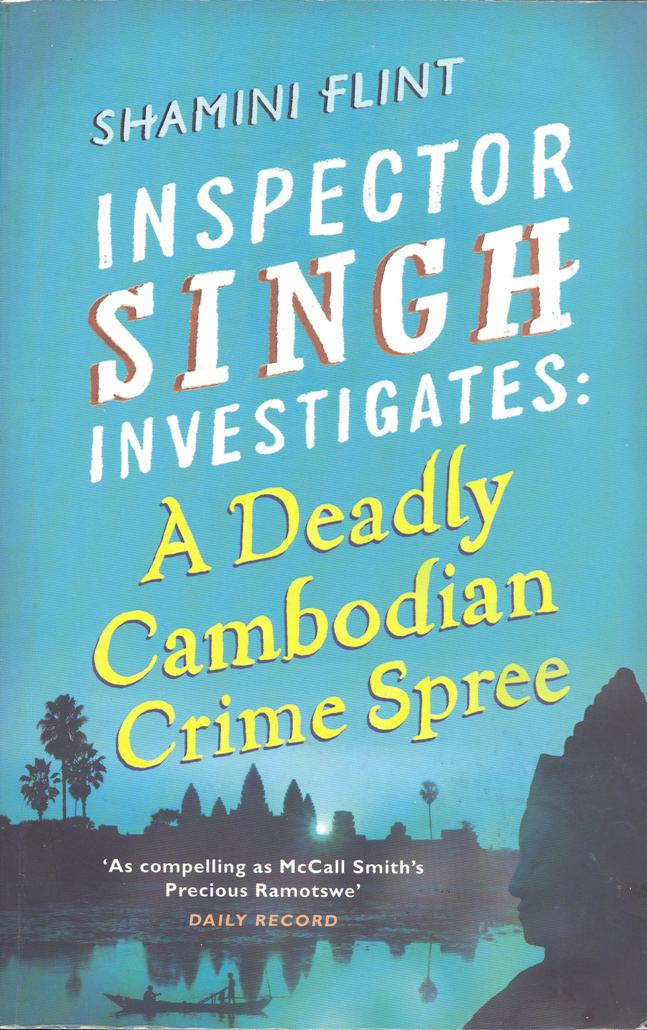
I read this book in May, 2018.
This is book four in Shamini Flint's very interesting series full of insights into Asean cultures, and featuring a fat detective inspector - Inspector Singh from Singapore. He is unfit, insubordinate, etc. It's easy to see why his superiors want rid of him. But he solves murders, especially those of victims in the lowest sections of society. Then he is dogged in his determination to get justice for the dead.
I usually try to read books in the right sequence, but, whilst on holiday in Sydney, I borrowed and read some of the later books in this series from the Australian Public Library - so I already know that Singh solved the Cambodian mystery and added to his growing fame.
The book starts modestly. To get rid of him for a while, his bosses send Singh as the Singapore delegate to the Asean War Crimes Trials in Cambodia. There Singh meets his minder - a remarkable young girl, Chhean, who does odd jobs for the Cambodian Authorities. She is his interpretor, and soon proves herself as a very able assistant, researcher, detective, and in the end she even ends up saving Singh's life. We are in ex Khmer Rouge, Pol Pot territory in the aftermath of mass murder and unspeakable horrors, cruel rape, torture, and the obscene killing even of screaming young children. Everyone now seems to be looking for lost family. Chhean does a full day's work, then searches through old documents at night. She is an orphan, and longs to find some clues to her missing family.
In Phnom Penh, and out of courtesy, Singh calls on the local police to pay his respects. He meets his counterpart Colonel Menhay, and the two get on. Singh discovers that Menhay is an efficient and honest man - very rare in the corrupt Cambodian police. Some vigilante is killing former Khmer Rouge , and to date it's now up to 10 murders, all unsolved. When a witness to the war crimes tribunal is killed, poor Menhay is given the case. Inspector Singh walks past as Menhay goes to the scene of the latest murder, and for some unknown reason Menhay invites Singh to tag along. He should have nothing to do with it, but Singh sees a fellow officer in need, and says he will help if he can. The UN doesn't want the local (corrupt) police to investigate the death of their witness, and wants some International oversight. Menhay suggests Singh, and so it's now Menhay and Singh's case.
We meet a wider cast. A french man is back in Cambodia after 30 years, looking for the wife and children he abandoned when Pol Pot took over when he was out of the country. Surely his family were all killed ? But how on earth could he possibly stay away for 30 years before at least checking ? We also meet a beautiful woman, Sovann, whose father had his head bashed in whilst she watched. Now, years after, she is married to an American. When Sovann, much later in the book, becomes a suspect and is charged with murder, her American husband confesses to the murder. Who really did it - husband, wife, or someone else ? The story swings back and forward. Singh must destroy a wife's love for her husband to get rid of a false confession. And then there is a surprise at the very end of the book concerning Singh's new friend Menhay.
It's a solid, strong story. I read it very quickly - always a good sign.
There is also quite a bit of humour in the book. Singh hates the local Cambodian food, and gobbles down Menhay's biscuits. Chhean initially perseveres with offering Cambodian food to Singh, but eventually finds her new boss some decent curry so that he can function.
All in all, it's a really good story, and I think Shamini has given a good and probably accurate description of life in modern day Cambodia. Let's hope that Cambodia may emerge from it's dark days and that there may be a better future for it's people.
Links to author index and home page
| Shamini Flint Heading | Author Index | Go to Home Page |
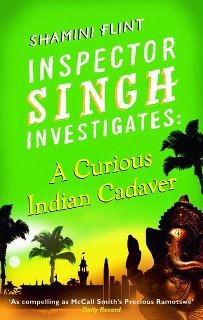
I read this book in Mar, 2018.
I thought I might be running out of reading material whilst on holiday in Sydney, so I borrowed books five and six of the Inspector Singh series from the Liverpool (Sydney) City Library.
This is quite an interesting series that I like for the insights it gives to various Asian cultures. In this book Shamini Flint gives us a relatively realistic picture of the contradiction that is India - the world's largest democracy. We are told that the place smells terribly, is corrupt, only just holds the lid on various religious antagonisms, has honour killings, and long memories of perceived injustices. Modern middle clas men step over lower castes on their way for their Costa coffees - if you are born into a lower caste your path in life is pretty much set for you.
This story starts with the assassination on Indira Ghandi by her Sikh bodyguards (in retribution for her army's storming of a holy Sikh temple), and the crowds retribution when a Sikh father walks out of his house to his death to allow his family to escape out the back door. He tells his eldest son to look after the family - especially little Ashu. Next we find Inspector Singh weary of sick leave, and in Mumbai to attend with his wife some relative's wedding. The bride is no other than the grown up Ashu - a westernised chemistry graduate who is trapped into an arranged marriage. She goes missing, and then a badly charred body is found and identified as that of Ashu by her brother. He identified her by her earings. How many times in crime fiction do we pick up our ears when we are told that someone is dead, but it's a badly burned body. I can't blame Shamini as so many other writers use this too.
Anyway, Inspector Singh is asked to investigate Ashu's death by her grandfather, and the local police (Deputy Commissioner Patel), who think Singh is a high ranking colleague from Singapore, give him every assistance.
Its a good story full of honour, and the sounds and smells of India. This is quite a quirky little series, but I like it.
Links to author index and home page
| Shamini Flint Heading | Author Index | Go to Home Page |
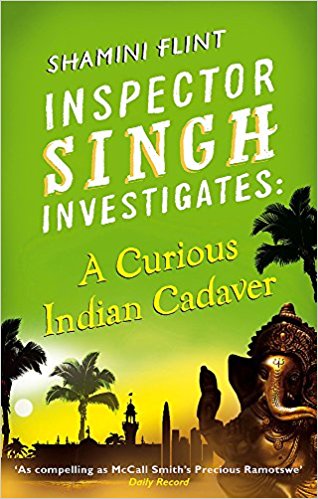
I read this book in Mar, 2018.
This is book six in the curry loving, wheezy, unfit, fat, Inspector Singh series, and this time Singh visits China. His fame from his success in India (book 5) has made his name known to the diplomat, Singapore's First Secretary (ie Ambassador) to China - Susan Tan. Her son Justin was killed three weeks ago, and she wants the famous Inspector Singh to join her in Beijing and tell her who killed her son, and why.
Whilst reading this book on holiday in Sydney - a second book borrowed from Liverpool (Sydney) public library - I happened to walk along the Chinese Quarter in Dixon Street (between Paddy's Market and Darling Harbour), and I noticed that some Chinese people were trying to get signatures on a petition protesting about the harvesting of body parts from political prisoners in China. This is the fate that befalls poor Professor Lao in this book. Shamini certainly knows her subject, and a lot about the countries which she writes about !
To my eyes, China does not seem a very appealing place - a one party set up allegedly of the people to serve the people, but more to serve corrupt party officials who enjoy privilege. They and their wives and children think they are untouchable, are above the law, and they radiate a sense on entitlemnet that is most unattractive. Everyone in China seems to be trying to claw their way up some ladder - aspiring to possess various electrical goods and big flat screen TV sets. Children are sent from the rural countryside to the polluted city to work long hours and send money home to support the family (and buy them large TV sets). When one such girl from the country tries to get rich quick in this story, and gets herself killed, her parents seem more disappointed about the loss of the TV set than the death of their daughter.
Susan Tan gives Singh a free hand to see what he can come up with, and a former chinese policeman Li Jan is employed as Singh's assistant and interpretor. The case has mostly grown cold, but Singh feels that Justin was beaten up and killed for a reason, and he thinks that Justin deserves to have his death investigated. Against all the odds, the dogged and very brave (foolhardy ?) Singh keeps going, and somehow manages in the end to get justice even in a country where privilege usually means that certain people cannot be touched.
It's a really good story full of detail about conditons in China but presented in a very readable form. It doesn't paint a very flattering picture, but I think Shamini tells it as she sees it. I hope she is safe in Singapore. I think she has written a powerful criticism of the Chinese State.
Just in case I am giving the wrong impression about this book, it is a very readable, enjoyable story, with quite a bit of humour to lighten the narrative. I look forwrd to reading the next book in series
Links to author index and home page
| Shamini Flint Heading | Author Index | Go to Home Page |
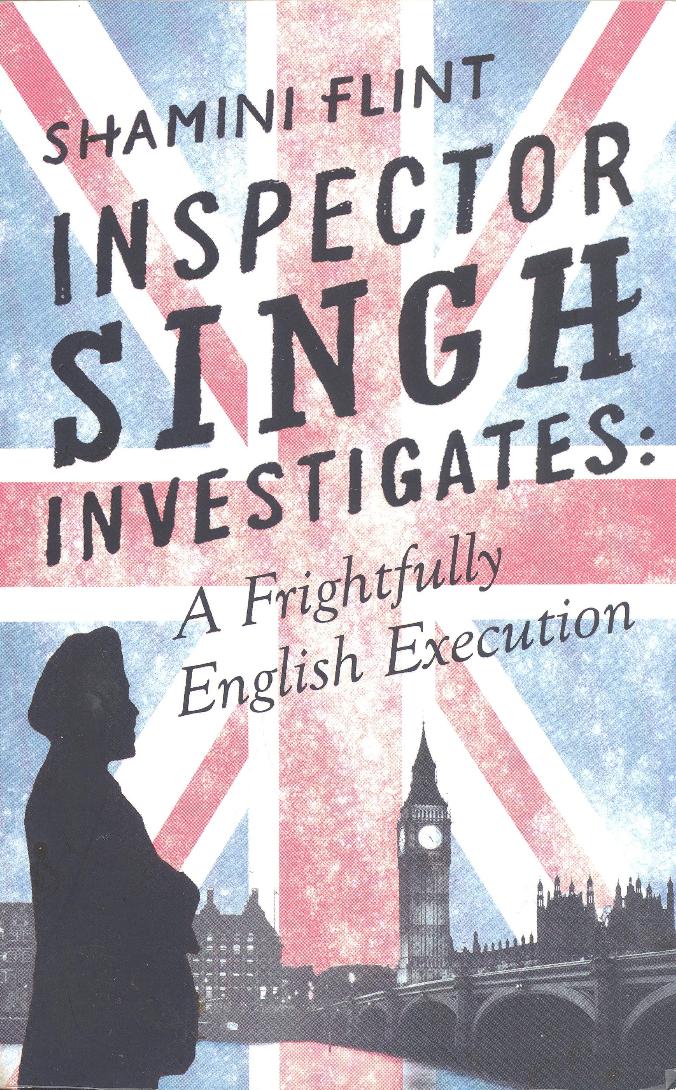
I read this book in Jun, 2018.
This is book seven in this interesting series based on somewhat hen pecked, very unfit, grossly overweight Inspector Singh of the Singapore police. His bosses would like to get rid of this maverick detective who is not really a team player, but he is the best murder detective they have. Usually they content themselves by sending Singh away on a mission to some Asian country where he solves a tricky murder, and we get to learn about that country's culture and people. This time he is being sent to the UK to represent Singapore at a Commonwealth Conference on policing in a multi racial society. It was interesting to read about the UK, but I missed background stories on his more usual Asian country visits.
Mrs Singh knows all about London from TV series, and of course has heard of all the top shops like Harrods, and so she decides to join her husband on this visit. She has a few second cousins in London, and is a keen shopper. Singh is assigned to a small team headed by Regina de Klerk to investigate a cold case from five years ago - the death of Fatima Daud, bludgeoned to death in an empty house. A female DI Anna Carmen is the UK member of the team - she is a high flyer, and is adding multi racial points to her CV. She is a good copper though, and she and Singh get along. They are suposed to be looking at how the cold case was investigated. Fatima's family closed ranks and the police got little help from the local community. What could and should have been done better ? It seems a good enough brief, but Singh has no interest in producing some dusty report. He is interested in the unsolved murder, and he sets out to get justice for the murdered girl - here is a crime to be solved. Mrs Singh sees a picture of the murdered girl in the case notes Singh is studying in their hotel room and realises that this could be the daughter they never had. Not only must Singh get her justice, but Mrs Singh will help him in the investigation. This of course is a big a mistake, and blundering Mrs Singh ends up kidnapped and in great danger.
An unusual aspect of the Fatima Daud murder was that the murderer amputated both Fatima's hands and took them away. Singh investigates and meets Fatima's brothers Ibrahim, Hanif and Fauzi, and Fatima's employer Raj. There are lots of different sub plots. Hanif is just back from Syria, is he an active or reformed terrorist? Ibrahim's restaurant has had a change of fortune, and is now making a mysterious amount of money. Is Raj into money laundering ? We now meet DCI Harris who is investigating a current murder of Cynthia Cole. Cynthia's hands have been amputated, and this rings a distant bell for Harris. Records identify the cold Fatima Daud case, and suddenly Fatima's murder is no longer cold, Carmen is transferred to Harris's team, and Singh is tolerated and mostly allowed to tag along, Harris and Singh being too old timers who get on reasonably well. Harris cannot get much asistance from his colleagues because all the force are tied up with a current terrorist scare. Someone is kidnapping victims, murdering them, and posting videos online. Of course, when there are two main stories, we experienced readers of crime fiction suspect that they might well turn out to be related.
All in all it was a good story that held my interest throughout, and there was a good climax with Singh frantic with worry about his missing wife, racing to her rescue but finding a lot more danger than he had ever met before.
I like this series, but at the time of writing this, this, book seven, is the latest book and I will have to wait until, hopefully, Shamini Flint gets round to writing book eight. I do hope there are to be more books in this series.
Links to author index and home page
| Shamini Flint Heading | Author Index | Go to Home Page |